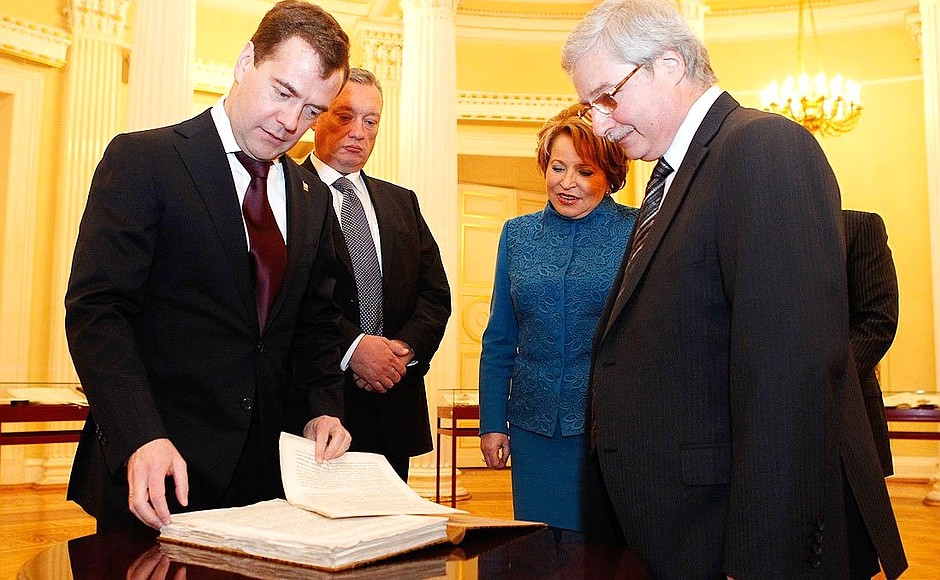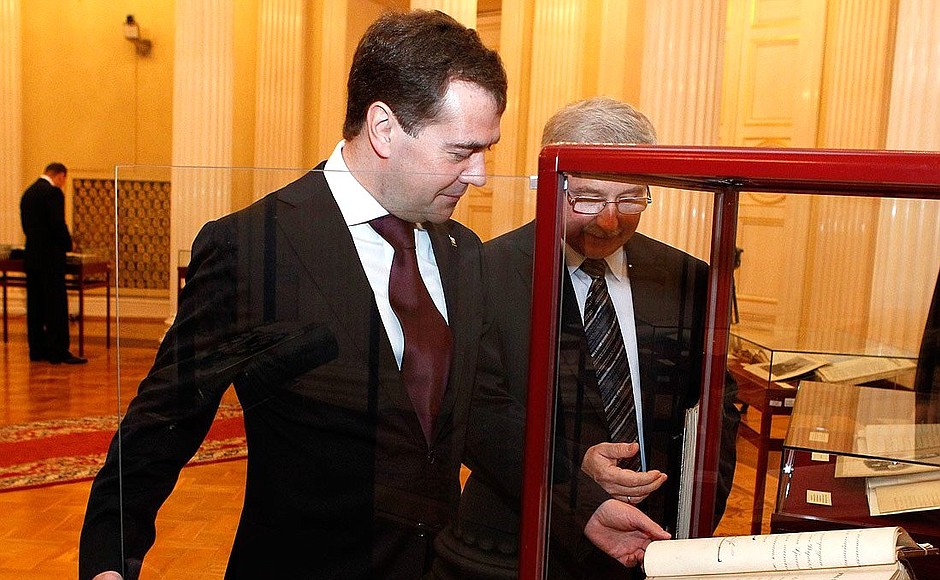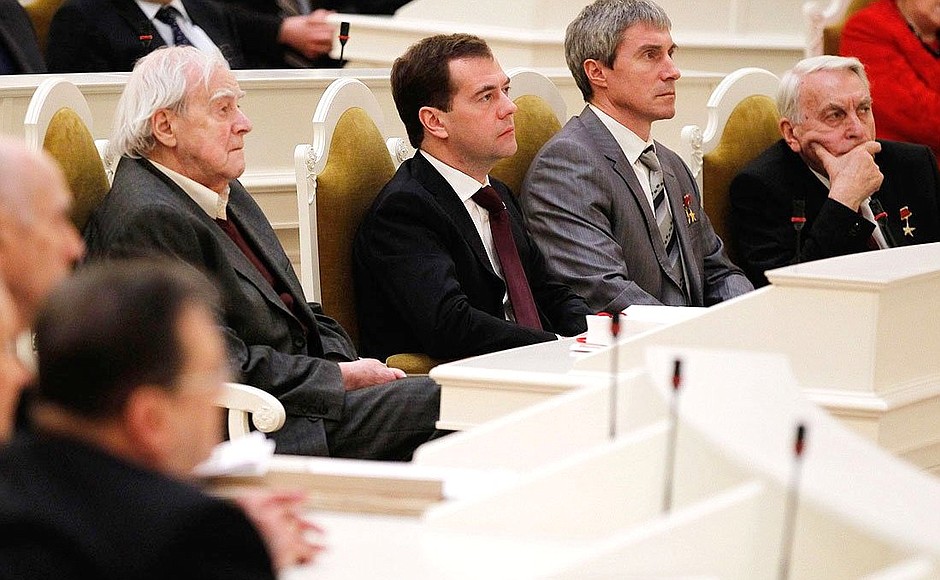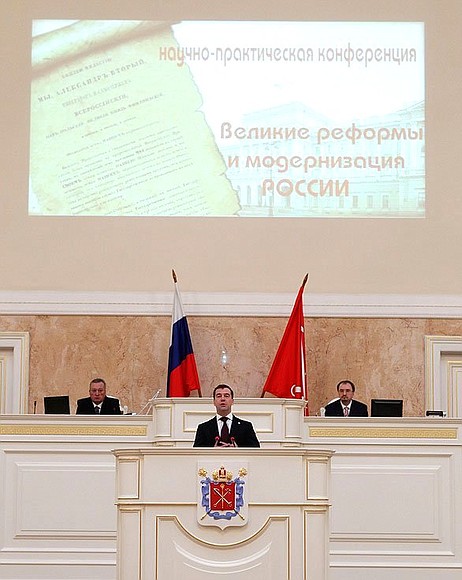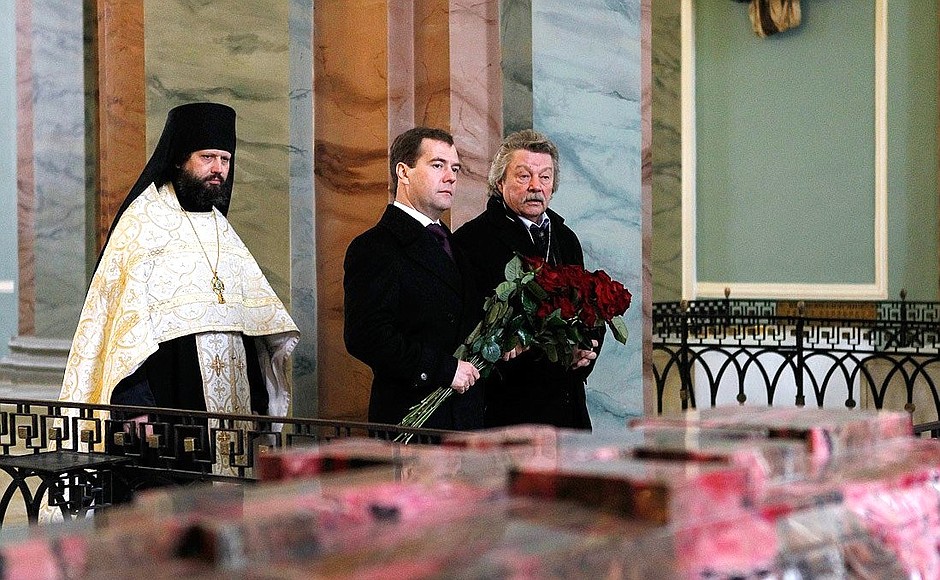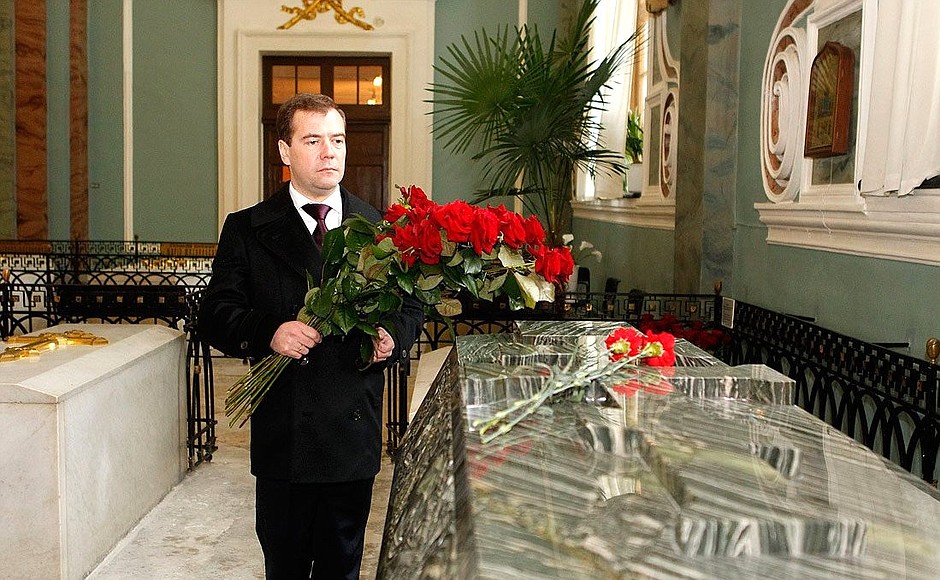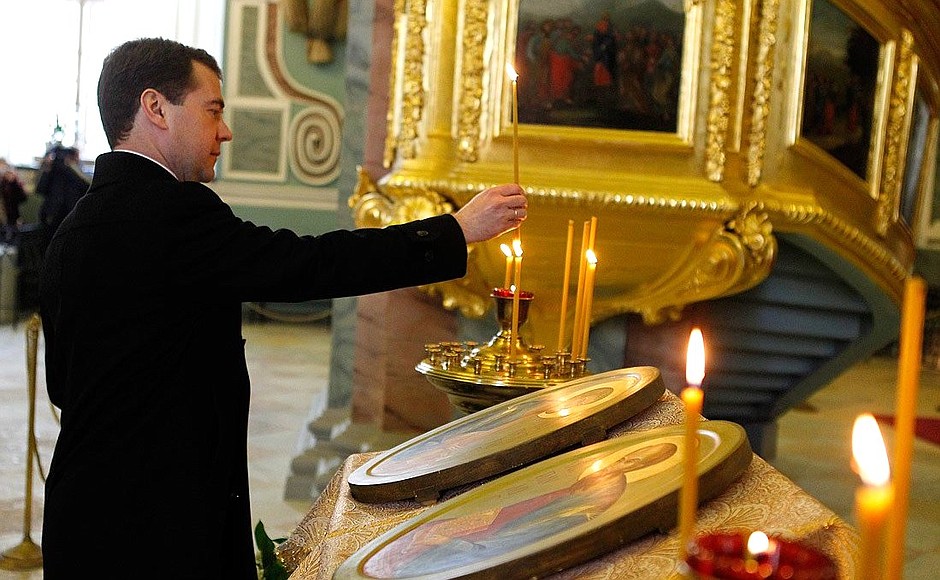The conference, held at the Mariinsky Palace, was attended by historians, diplomats, public figures, and representatives of religious denominations. An exhibition of historical documents related to the signing and the course of the emancipation reform was organised on the sidelines of the conference. The main exhibit was the original Emancipation Manifesto, which was signed by Emperor Alexander II on March 3 (February 19), 1861.
Dmitry Medvedev also laid a wreath at the tomb of Alexander II in St Peter and Paul Cathedral.
* * *
President of Russia Dmitry Medvedev: Good afternoon,
I am happy to welcome all the participants and guests of this international conference devoted to the great 19th century reforms in Russia.
It would be surprising if today we did not perceive these reforms as an integral part of our history. Their careful scrutiny is an absolute priority for science and for all those involved in politics, for all who believe in the progress of modern Russia. Their detailed study is essential for the modernisation processes unfolding in our economy and in our society as a whole.
The age of great reforms, which is the theme of this conference and the presentations we heard earlier and of which there are more to come, began with the abolition of serfdom. Our country is marking the 150th anniversary of this event today and in the course of this year. Emperor Alexander II signed the Emancipation Manifesto in St Petersburg. I have just held it in my hands. It is an absolutely unique document both in terms of its content, the amount of effort involved in adopting it and its importance for our country.
St Petersburg is a special city. Peter the Great established it as a city of change. Since then St Petersburg has been a symbol of rapprochement between our country and Europe.
In the 19th century, when Russia stood at the crossroads, extensive transformations and economic changes were launched here just as they were taking shape in European countries, where some of them had already been completed or were still to come. This was an imperative of the time.
Russia also needed to change, to become an advanced country that shares values with Europe. This crucial choice, a choice for development and freedom was made in that period. It began with the abolition of serfdom, which had for centuries undermined the human rights and dignity of millions of Russian people. Finding personal freedom enabled them to become full-fledged subjects of the Russian Empire, to exercise their initiative and to express their opinions.
”Today we are continuing to improve our democratic institutions, which are still very imperfect, trying to change our economy and to transform our political system. In fact, we are continuing the course that was laid 150 years ago.“
Of course, we should not idealise the situation immediately following the reforms, but that was their intended purpose. The reforms contributed to social mobility, promoted the growth of the urban population, encouraged the transition to capitalist forms of economic management and, ultimately, paved the way for Russia's economic progress and development, the evolution of the domestic market and industrial growth.
The land reform was followed by rural and urban reforms, which changed the structure of local government. All this remains extremely important for our country today.
Major changes occurred in court proceedings. For the first time in its 1000-year history, Russia saw the establishment of contested action, trial by jury, magistrate court and legal defence.
The public education reform made education accessible for all social classes. Universities also received some degree of autonomy at that time. Censorship, which up to that moment had been among the most stringent in Europe, became less severe.
Vasily Klyuchevsky wrote that in the course of the centuries preceding February 19, 1861 Russia had had no law of such monumental importance, one that determined to an equal extent the development of a wide variety of spheres in our lives. It is obvious that the entire country had been waiting for these transformations. The best minds in Russia fought for these reforms and they were supported and carried out by Emperor Alexander II, who has been rightly called the Liberator. The great reforms were certainly an enormous challenge for him and an exceptionally courageous act. We must not forget this.
Bear in mind that Catherine the Great and Alexander I had both been conscious of the need to abolish serfdom, which was in effect slavery. Emperor Nicholas I established nine secret committees on agrarian issues, repeatedly declared that he wanted to free the peasants and give them the land they had worked. But ultimately none of these resolute rulers had the courage to carry out the revolution from above.
It became the destiny of Alexander II to liberate Russia from the unjust, archaic and inhuman order. As it happens with any person who undertakes to carry out fundamental changes, he was discouraged. He was discouraged by many and for various reasons. Some resorted to the arguments always used in such cases, that the country would fall apart, that it would descend into chaos and most notably, that the people were not ready for freedom, that they wouldn’t appreciate it and wouldn’t know what to do with it – basically, that they simply didn’t need freedom.
Like any reformer, he rarely heard words of gratitude. One of his contemporaries said: ”Whatever the Emperor did, all his actions met with criticism and impatient demands.“ But as a great reformer, Alexander II knew that Russia must stand on a par with other European states. He understood that Russia needed freedom, that it yearned for freedom. I would like to quote his words, which I think have already sounded earlier: ”I am too certain of our sacred cause for anyone to be able to stop me.“
Thus the slavery of serfdom was abolished in Russia — and earlier than in many other countries, including the United States. Of course, at the time there was no clear understanding of democracy or of the need to establish a mature civil society, and the attitude towards these concepts was different at that period. But most importantly, the choice was made. Freedom became a value for the first time in the entire 1000-year history of Russia. That is crucial. And the man who brought us freedom gave his life for it.
”Political and social transformations should be thought out, rational and gradual but unfaltering.“
Disputes about what happened to our country later will probably never end. This is the essence of human inquiry, the essence of historical research. But the questions will remain. How could it happen that in our country the desire for freedom ended with the Bolshevik dictatorship several decades later? Who bears greater responsibility for this dictatorship: those who lingered with the reforms and postponed them or, conversely, those who acted too hastily and tried to achieve too much in a very difficult situation? Was the backlash of the Alexander III reign or the excessive radicalism of the first Russian parliaments inevitable? Finally, was the October Revolution unavoidable with the gulags that followed? Some believe that our country’s tragic 20th century history was the result of an unsuccessful freedom injection and that the sceptics who believed the great reforms were not suitable for the people of our country had been right.
I hold a different view. Alexander II had inherited a country whose major political institutions were serfdom and the military and bureaucratic chain of command. He saw the weakness and futility of these institutions behind the apparent might of the empire – and we always knew how to make an impression. Inefficient economy and a social structure that was incompatible with development goals threatened an imminent collapse of the country.
Alexander II and his supporters abandoned conventions, although it was extremely difficult, and showed Russia the path into the future. This is their greatest achievement. This path was long and very difficult, and we cannot say that it has been completed to this day. But freedom, justice, and the subsequent economic prosperity never came quickly and easily to any nation in the world.
I hope that 21st century Russia will bear witness to the rightness and far-sightedness of the 19th century reformers.
Today we are continuing to improve our democratic institutions, which are still very imperfect, trying to change our economy and to transform our political system. In fact, we are continuing the course that was laid 150 years ago. I would like to draw your attention to the fact that it's not the fantasy about our nation’s special way or the Soviet experiment that turned out be the most viable, long-lived ideas, but the concept of a normal, humane order which was conceived by Alexander II. And ultimately, from the historical perspective he was right, and not Nicholas I or Stalin.
The experience of that distant age remains relevant to our practical efforts. I would like to name a few principles that I consider important today. In a way, this is part of processing the experience of 150 years ago.
First of all, freedom cannot be postponed until later and we must not be afraid that a free individual may make an inadequate use of a personal freedom. That path leads to a dead end.
Second, political and social transformations should be thought out, rational and gradual but unfaltering.
Third, intolerance, extremism and terrorism as its extreme manifestation will remain the enemies of free development. Bear in mind that terrorism, which is a huge problem for our country, in fact, appeared as a phenomenon almost simultaneously with the great reforms.
”Freedom from fear, from humiliation, from poverty, from disease, freedom for all – that is the aim of development. This is not just high rhetoric. This is what every reasonable and modern person expects. Different words can be used to express this but this is what we think about every day.“
Fourth, we must be clear that the state is not the purpose of development but a development tool. Only the involvement of all of society in these processes can give the desired positive effect, and only in this case do we stand a chance of success.
Fifth, we must remember that the nation is a living organism and not a machine for replicating the prevailing ideas of the day. It cannot be kept together by tightened screws. It is also clear that excessively harsh policies and an excess of control usually do not lead to the triumph of good over evil, or with reference to modern reality, to a victory over corruption but to its growth, not to the evolution of governance but to its degradation. It is therefore essential to give society opportunities for self-organisation.
Colleagues,
The authors of the great reforms and Alexander II did not just think about the future but created it, and that is the biggest challenge. Practical politics is always more difficult than the most beautiful theories. But they believed that the reforms could be implemented without turmoil or violence, that it was possible to transform the backward and feudal Russia into a modern and free country.
The aim of modernisation and progress has always been to enhance freedom in society, in international relations and in everyday life, to ensure that each individual life and fundamental rights and freedoms are always protected by the state.
Freedom from fear, from humiliation, from poverty, from disease, freedom for all – that is the aim of development as I see it. This is not just high rhetoric. This is what every reasonable and modern person expects. Different words can be used to express this but this is what we think about every day.
We will celebrate the 1150th anniversary of Russian statehood next year, at least if you subscribe to the conventional point of view on this fact. I would like to inform you that today I have signed an executive order on the organisation of events for the celebration.
Our state, our country has existed for over 11 centuries. This state took very different forms. Its government, political regime, strategic goals and way of life have all changed through the ages. Our history was very turbulent and dramatic, and we can certainly understand a great deal by studying it. But I hope that in the last 150 years we have come to realise the most important thing: that freedom is always better than its absence. Thank you.
